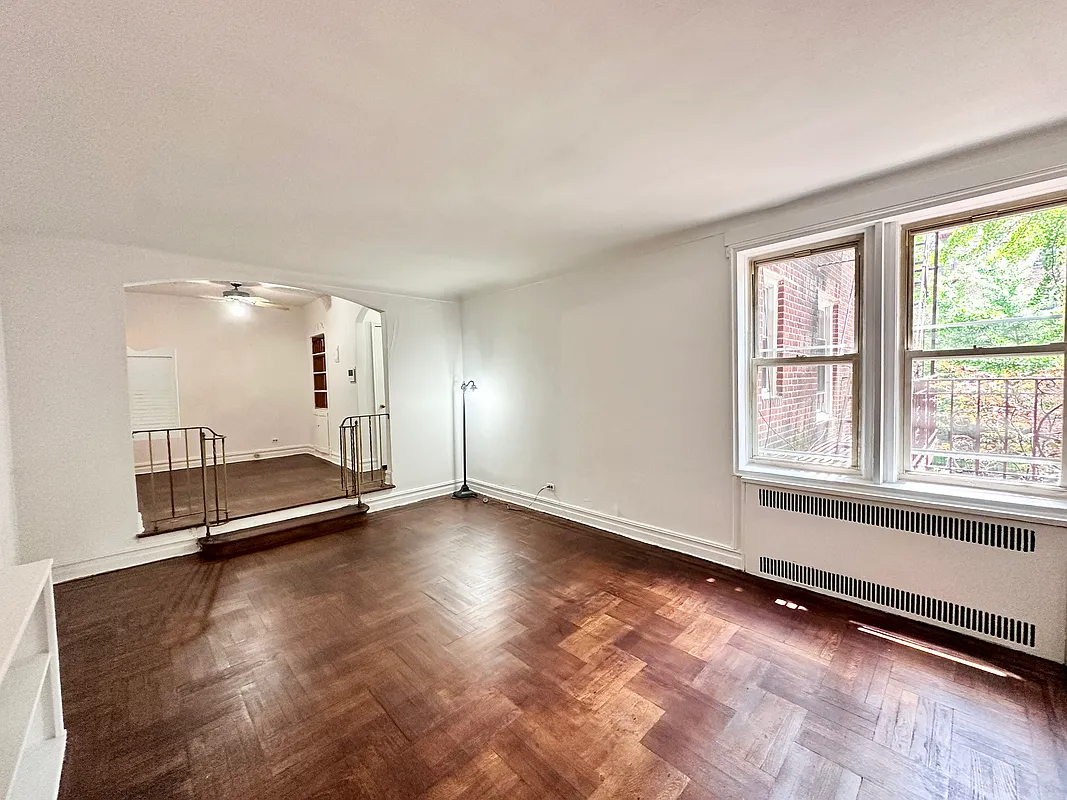Has the Buyers' Market Come to Brooklyn? Duh.
HMS Associates released some dismal, but not surprising news yesterday: Average Brooklyn home prices dropped two percent to $695,285 in Q3 of 2008 (from $708,457 in 2007), as opposed to a three percent rise in the first quarter and an eight percent rise in the second; we had one percent more sales (from 988 to…

 HMS Associates released some dismal, but not surprising news yesterday: Average Brooklyn home prices dropped two percent to $695,285 in Q3 of 2008 (from $708,457 in 2007), as opposed to a three percent rise in the first quarter and an eight percent rise in the second; we had one percent more sales (from 988 to 999). Now for more not-very-surprising neighborhood breakdowns: prices were up in Brooklyn Heights and Prospect Heights and down in Sheepshead Bay, Greenpoint and Park Slope (well, maybe that’s a wee bit surprising). The number of homes sold went up in Carroll Gardens, Williamsburg and Marine Park and went down in Greenpoint, Fort Greene, and Brooklyn Heights. Bed Stuy, East New York and Brownsville weren’t included; had they been, the average prices would surely have been much lower. Poor Bed-Stuy was recently named by CNN as having one of the highest foreclosure rates in the country. We know our readers are very skeptical of numbers, but the authors of the study say they translate to one thing: a buyers’ market. Agree?
HMS Associates released some dismal, but not surprising news yesterday: Average Brooklyn home prices dropped two percent to $695,285 in Q3 of 2008 (from $708,457 in 2007), as opposed to a three percent rise in the first quarter and an eight percent rise in the second; we had one percent more sales (from 988 to 999). Now for more not-very-surprising neighborhood breakdowns: prices were up in Brooklyn Heights and Prospect Heights and down in Sheepshead Bay, Greenpoint and Park Slope (well, maybe that’s a wee bit surprising). The number of homes sold went up in Carroll Gardens, Williamsburg and Marine Park and went down in Greenpoint, Fort Greene, and Brooklyn Heights. Bed Stuy, East New York and Brownsville weren’t included; had they been, the average prices would surely have been much lower. Poor Bed-Stuy was recently named by CNN as having one of the highest foreclosure rates in the country. We know our readers are very skeptical of numbers, but the authors of the study say they translate to one thing: a buyers’ market. Agree?
Photo by bondidwhat.





“i don’t believe that Brooklyn real estate went up for over 100% from what it should have been selling at – i believe that in the late ’90’s and early ’00’s broorklyn real estate was selling for too little. the housing was underpriced.”
And the winner of the Tortured Argument Lacking any Facts Whatsoever award goes to…
fsrq and DOW8000SP800 – neither of you have any facts, and unless NY population goes down significantly, then you will be proven wrong. i don’t believe that Brooklyn real estate went up for over 100% from what it should have been selling at – i believe that in the late ’90’s and early ’00’s broorklyn real estate was selling for too little. the housing was underpriced.
if the population continues to grow at the pace that the statisticians are expecting, we continue to see a high demand for property here.
agree that prices will drop now, but will never come back in 10 years?? doubt it.
I guess sebb was the faded type spammer all along
sebb vs what…
This is gonna be on fire.
Not Florida RE, fsrg. When I say one’s lifetime I’m counting from when they are old enough to own. You had to be 30 or 40 (average) to have owned in 1930. By 2003, you were “well out of daisys to push up”. We’ll never see these prices in real terms before we die. We’ll see bubble prices but not like the recent past.
Looks good from here “what”.
5 real estate markets most likely to rebound
Seattle tops the list of best places to invest in commercial property
The financial meltdown creates a domino effect in New York. Office vacancies rise, investment workers don’t get bonuses and skimp on Christmas gifts, hurting retail. But New York is a one-of-a-kind market that is expected to stay strong. Falling rents could even make the city more livable.
View related photos
iStock
More from Forbes.com
• Top-Earning Dead Celebrities
• Is Your Office Making You Sick?
• Superpowers Of The Super-Athletes
• The Gatekeepers That Stand Between You and Success
• Fastest-Growing White-Collar Paychecks
Most popular
• Most viewed • Top rated • Most e-mailed
Paulson: Troubled assets will not be purchased
McCain says Palin didn’t hurt presidential bid
2,900-year-old Phoenician remains found
Police: Iraqi soldier kills two U.S. troops
Makeover! ‘What happened to grandma?’
Most viewed on msnbc.com
Oldest WWI survivor remembers forgotten ones
Pilot lands safely after going blind in mid-air
Souped-up immune cells catch disguised HIV
Astronauts head for extreme space makeover
A running friendship saves the life of one pal
Most viewed on msnbc.com
Paulson: Troubled assets will not be purchased
2,900-year-old Phoenician remains found
Soap up! The 12 germiest places in your life
Big purse saves college student from bullet
Oil slips below $57 on global growth pessimism
Most viewed on msnbc.com
Latest interest rates
Mortgage Home Equity Savings Auto Credit Cards
See today’s average mortgage rates across the country.Loan type Today +/- Last week
30-year fixed 6.06% 6.22%
15-year fixed 5.76% 5.93%
30-year fixed jumbo 7.50% 7.57%
5/1 ARM 5.93% 6.02%
7/1 ARM 6.16% 6.24%
Source: Bankrate.com | View rates in your area
See today’s average home equity rates across the country.Loan type Today +/- Last week
$30K HELOC 4.88% 5.01%
$30K home equity loan 8.12% 8.09%
$75K home equity loan 7.99% 7.93%
$50K home equity loan 8.00% 7.94%
$50K HELOC 4.70% 4.75%
Source: Bankrate.com | View rates in your area
See today’s savings rates across the country.Savings type Today +/- Last week
Money market 2.42% 2.44%
$10K money market 2.67% 2.79%
Six-month CD 3.00% 3.03%
One-year CD 3.48% 3.55%
Five-year CD 3.86% 3.89%
Source: Bankrate.com | View rates in your area
See today’s average auto rates across the country.Loan type Today +/- Last week
48-month new car loan 6.58% 6.60%
36-month used car loan 7.15% 7.20%
36-month new car loan 6.82% 6.84%
60-month new car loan 6.59% 6.62%
72-month new car loan 6.44% 6.44%
Source: Bankrate.com | View rates in your area
See today’s average credit card rates across the country.Card type Fixed Variable
Standard 13.42% 11.61%
Gold 11.73% 10.29%
Platinum 10.77% 11.48%
All 12.00% 11.30%
Source: Bankrate.com | View more rates
By Dorothy Pomerantz
updated 7:09 a.m. ET, Tues., Nov. 11, 2008
If you’re a homeowner seeing property values plummet, look to the commercial real estate market for solace. It might tell you which areas will recover fastest — and which will likely remain weak.
The Urban Land Institute recently asked 700 real estate professionals to name the best (and worst) places to invest in commercial real estate in the coming year. Those surveyed included private developers, Realtors and Real Estate Investment Trust executives. Their answers also apply to the residential market, since the single-family-home sector typically follows the economy. As wages go up and there are more jobs, more people can buy homes, pushing prices up.
The best cities in which to invest are those that are considered gateways to international investment, have vital downtowns where people can forgo cars, and don’t have a glut of condos or office space.
Story continues below ↓
——————————————————————————–
advertisement | your ad here
——————————————————————————–
These traits landed Seattle the No. 1 spot on the list. No city scored above a 6.15 on a scale of one to nine (one being an abysmal place to invest and nine being excellent).
More on this story
Slide show: Best and worst places for real estate investors
Seattle is “a diversified market, has a good base of business and is becoming a 24-hour city,” says Stephen Blank, senior resident fellow, finance, of the Urban Land Institute. “It’s going to be in a good position to come back.”
Although the city is suffering from the loss of Washington Mutual and the downsizing of Starbucks, Boeing and Microsoft are still relatively strong. Apartment vacancies are low and there aren’t too many new buildings going up, meaning the market won’t be oversupplied. The same is true in the retail space.
San Francisco comes in second with a 6.12. The City by the Bay learned from the tech crash of 2001 not to overbuild. There is a reasonable supply of office and apartment space, which should limit vacancies. San Francisco’s port is also expected to help the city during the downturn as Americans continue to rely on Asian imports.
Washington, D.C., New York and Los Angeles round out the top five.
Of course, there’s no guarantee that an improved commercial market will lead to an improved home market. However, investors have a better chance of seeing home prices rise in fundamentally strong markets like Seattle than in struggling cities like Detroit.
More from Forbes.com
Click links below for slide shows
America’s next foreclosure capitals
How to squeeze more money from your home
Best and worst places for real estate investors
Video: Million-dollar foreclosures
Cities where your nest egg goes farthest
It landed at the bottom of the list, scoring a 2.24. Detroit has been reliant on the car industry, which is rapidly shrinking. Other businesses are unlikely to fill the void in the next few years, which means the city will be hit hard by further economic struggles.
New Orleans also lands near the bottom with a score of 3.33. The city has been losing businesses to Houston, Dallas and Atlanta since Hurricane Katrina hit in 2005.
The other cities at the bottom of the list — Columbus, Ohio, Milwaukee, Wis., and Cleveland — suffer from dying industries and lack of tourist appeal.
Recent attempts to turn downtown Milwaukee into a thriving 24-hour city haven’t been enough to
Yes, cw…some areas nice, some marginal, some hell. Bed Stuy is very large. Don’t even bother checking out those two foreclosures of the day.
DIBS – I need to learn more about Bed Stuy for sure. The neighborhood is obviously going to have a lot of available properties in the coming months. I just know literally nothing about the area except that some parts of it are not-so-nice. I looked at an apartment to the east of Pratt, around Bedford Ave, a couple years ago, and the building was legitimately falling apart and smelled like rotting meat. The whole area around it seemed about the same, but Bed Stuy’s a big place and I’m sure it’s got some nicer sections.
“WRONG!!! It’s called greed and delusion! This has nothing to do with finance.”
The What is absolutely correct. The spiking bar for required credit scores cancels out the need for personal finance education. You are officially educated when you reach 700 and some change. Finance meant nothing when banks became brokers with Wall St and “hot-potatoe’d” mortgage debt to unsuspecting investors. Guess who’s back: Traditional Lending Standards. Tighty tighty.